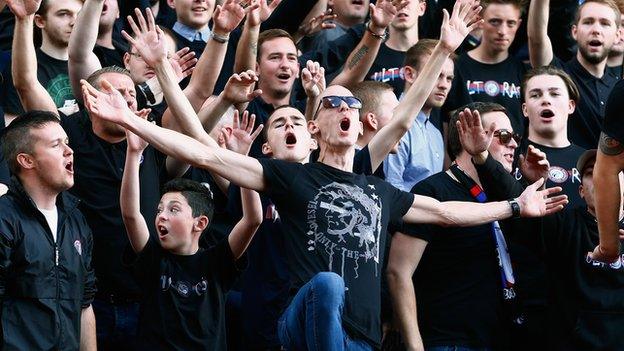Price of Football: Why fan protests will persist despite price freezes
- Published
- comments
Football costs down or same for most
The BBC's fifth Price of Football survey will come as encouraging news to the many fans who have grown used to the price of their loyalty consistently rising.
The fact the cost of watching football in Britain has mostly remained the same or even become cheaper, suggests pressure from supporters and government has finally had an impact after the ticket price inflation of recent seasons, along with clubs becoming more prepared to pass on more of their ever-increasing broadcast rights revenues to their customers.
However, it appears the sport is still becoming more expensive for the poorest fans who want to go and watch occasional matches.
The average price of the cheapest match-day ticket has gone through the £30 barrier for the first time in the Premier League, a rise of 6.5%. Across the top five leagues of English football the cost is £22. And while inflation seems to have eased for season tickets, fans still face increasing expense when it comes to official merchandise.
Last year, the then sports minister Helen Grant told me she was "cross and concerned" about ticket prices, and asked clubs to review their customer strategy after it was revealed the average price of the cheapest tickets had risen at almost twice the rate of inflation since 2011.
That led to fears that clubs had lost touch with some fans, and ran the risk of pricing some traditional supporters out of the game, along with younger fans. It looks like that message has partially got through, because we now learn that 70% of tickets (two-thirds in the Premier League) have been frozen or even reduced this year.
Click here, external to play with the Price of Football calculator and see what your support is costing you.
More on the Price of Football: |
|---|
The Premier League has grown increasingly frustrated with surveys focusing on ticket prices, believing they are too simplistic and fail to take into account the complexities of pricing structure, along with various initiatives.
They also point to the fact that crowds are as healthy as ever, with record 96% occupancy at stadiums and that 40% of those attending are aged 18-34.
Hence, the Premier League recently published its own research, showing that season ticket holders - who make up two-thirds of top-flight crowds - paid an average of £32.50 for adults and just £10 for juniors.
The Football League also says it rewards loyalty with average price paid per spectator as low as £14 across the 72 member clubs.
Some clubs do more than others, of course. At Everton for example, the average price for a season ticket has fallen in real terms by 23% over the last 10 years, with under-11s paying just £5 per game.
Some will see that all this as decent value for one of the most compelling leagues in the world, comparing favourably with other sporting events and entertainment.
Share Premier League money with fans - Palios
Others, however, will argue that in a period of almost zero inflation, and after the Premier League announced the biggest TV deal in football history in February, worth some £5.136 billion (a 70% increase), freezing ticket prices is the least they should be doing.
This all comes at a time of continued anger by some fans at the prices they are expected to pay. In 2013, Man City supporters protested at being charged £62 for tickets at Emirates Stadium, and there have been a number of demonstrations and marches at spiralling costs ever since.
The Football Supporters' Federation (FSF) has been calling for more affordable tickets with its 'Twenty's Plenty' campaign, designed to lobby clubs to cap prices for away fans at £20.
Swansea City already caps away tickets for their supporters at £22, with other clubs committing to a range of reciprocal deals over certain fixtures. The FSF says if each club contributed £1m per season, its £20 price target could be met for all away fans. It also says that the Premier League clubs should use some of the £24m they saved on unpaid parachute payments to Norwich City, after the club bounced back to the Premier League following relegation.
To be fair, the Premier League has listened. This is the third season of its Away Fans Fund, which sees each club set aside £200,000 every year to help subsidise tickets and transport costs for travelling supporters.
The FSF says it is pleasantly surprised by the way the clubs have engaged, and £738,000 has now been saved for the country's 70,000 Premier League regular away fans through the scheme. That works out at about £10 for each supporter.
However, at a time when some top players get paid £200,000 for around five days work, and when the cost of watching live football on TV is more expensive than anywhere else in Europe, the FSF now wants the Premier League to go much further.
It makes the point that the additional revenue from the £5bn domestic television deal alone (with the forthcoming overseas TV deal expected to result in an another £3bn) equates to £46 for every fan at every game.
The picture around the UK |
|---|
There is mounting evidence, however, that the Premier League is willing to redistribute more of its wealth and play a greater role in society.
Although some want more, clubs have committed to share £1bn over the three years of the new TV deal, with 'fan engagement' one of five areas set to benefit.
Clubs have already promised to pay the living wage for their staff, improve facilities for disabled fans, and have agreed to expand a school sport programme to every primary school in England and Wales. I'm told the clubs intend to do more to help with ticket affordability but want to wait to see how much is generated from their overseas TV rights deal, and the result of an Ofcom investigation into how those TV rights are sold.
But the price of football is about more than just tickets.
The BBC study found that the 20 Premier League clubs brought out 50 new strips this season - 10 clubs putting new third kits on sale.
Price of Football: 20 clubs, 50 shirts, one summer
All the teams now change their strips each year. The average cost of an adult shirt in the Premier League is now almost £50 thanks to a 4.82% increase in the average price this season, with 10 clubs putting their prices up. A full adult strip at Manchester United would set you back £118 (a junior kit is £103).
The clubs say this is driven by consumer demand, but others believe supporters are being taken advantage of.
The top clubs have to compete with wealthy European rivals like Real Madrid, Barcelona and Paris St-Germain for the world's best playing talent, and after another season of disappointing Champions League performances by English representatives, the need to maximise match-day revenue to sustain on-field performance is a persuasive one. After all, the clubs are businesses, geared to providing the best football competition, not charities.
On the other hand, critics can point to the £115m that clubs paid in agents' fees last year alone, and are entitled to ask whether ticket prices are still too expensive, especially when compared to some leagues abroad, including Germany and Spain - where a season ticket at Barcelona can be picked up for as little as £78 (on top of an annual membership fee).
Many feel that football is unlike any other business and fans should be treated as more than mere customers. If you have been brought up as a loyal follower of a club, it is not easy to just switch allegiance to an alternative football provider. Some think the clubs need to remember that.
Prepare for the protests to continue, regardless of the price freezes that this year's fifth BBC annual study has revealed.
You can download the full results for 2015 here, external (pdf 536 KB).
- Published14 October 2015

- Published14 October 2015

- Published14 October 2015

- Published14 October 2015

- Published14 October 2015

- Published20 June 2016

- Published7 June 2019

- Published2 November 2018
